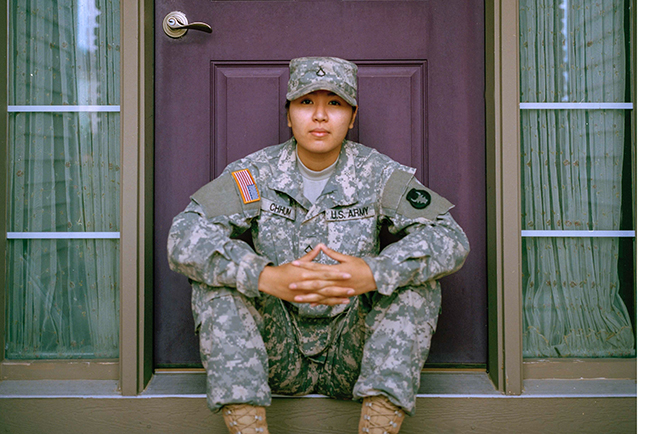
With all the sentimentality, family traditions, and memory-making, the holidays accentuate the needs a military family feels throughout the year.
By Kimberly Wootten
This will be the first Christmas my four-year-old can say he’s spent more Christmases with his dad than without—a common story for military families. Having your service member home for birthdays, holidays, and important milestones every year is rare and almost incomprehensible for a military family. Between deployments, training, and everyday demands of the military, time together as a family is a gift, not an expectation.
With all of the sentimentality, family traditions, and memories to be made, the holidays accentuate the needs military families feel throughout the year. Because of this, churches have a unique opportunity to step into these tender spaces and welcome military families into their communities, meet their needs, and train them to walk in a manner worthy of the gospel. In doing so, your church can obey the Great Commission and deploy military families for the glory of God.
“With all of the sentimentality, family traditions, and memories to be made, the holidays accentuate the needs military families feel throughout the year.” — Kimberly Wootten Click To TweetUnderstanding military families
In order to welcome military families into your church with Christlike hospitality, your congregation must first identify these families and the cultural barriers that exist. Here are a few questions you can ask to help highlight who these families might be in your area.
- What service members are in your community?
- Is there a nearby military installation?
- If not, are there national guardsmen or reservists living or serving in your area?
If your church is in proximity to a military installation, consider designating a church member, deacon, staff person, or elder to reach out to the chaplains and seek to understand the needs of the families in their unit. Knowing the training and deployment schedules will reveal unique ways your congregation can come alongside those service members and their families.
The military has a unique language that can create barriers for civilians. TDY, PCS, MOS, and BAH—the list of acronyms is long and the lifestyle is foreign, which can intimidate outsiders. Developing an understanding of the military branches and basic terminology will help remove cultural barriers. That may sound daunting, but simply listening and seeking to understand the language will help families feel seen and known.
Meeting needs
We all live with constraints, but the difficulties military families face can be particularly tricky. As churches identify and welcome military families, the physical and relational limitations that leave them feeling disconnected and lonely will become evident. But a local body of believers can meet many needs.
For example, offer babysitting so a family member can make appointments or go Christmas shopping without the children in tow. Providing meals can ease the burden of regular household tasks. Helping with a honey-do list while a service member is away can relieve a spouse who is maxed out. House projects, winterizing the home, or fixing broken items often remain unfinished due to limited capacity. Simple things such as decorating a home or hanging or taking down Christmas lights can be a huge morale booster. When church members see a need and step into that gap, they significantly lighten the constraints on military families.
“When church members see a need and step into that gap, they significantly lighten the constraints on military families.” — Kimberly Wootten Click To TweetThe military, and many military non-profits, offer services to support and meet physical needs of service members and their families. But the church offers something none of those organizations can: the life-changing power of the gospel experienced through the body of Christ.
Building relationships
Due to the transient nature of military life, families are eager to develop connections within the body of Christ. They look to the local church in hopes of forming deep relationships. Yet they face distinct hurdles to involvement in the local church: lack of childcare, transportation needs, time, and finances. As your church plans holiday events, taking the time to consider these factors will bless your military families and enable more of them to participate and bring their friends.
Special holiday traditions might stop abruptly for a military family whose service member is away. Additionally, a military family may not be able to travel for the holidays to be with their extended family. Inviting military families to join in your family traditions or attend local events with you can be a huge ministry. Church members might consider asking a military spouse to grab coffee or go shopping to take a break from the hustle of everyday life. These types of invitations offer life-giving connections in a season of loneliness. Hosting military families for holiday meals or sharing special traditions is an opportunity to welcome others as Christ welcomes us. It is a tangible expression of the gospel.
The ministry opportunity
Built into the fabric of military families is a desire to serve and care for others around them. A church offering connection points for these families and individuals to quickly get involved enables them to faithfully walk as followers of Christ.
From firsthand experience, military families know how to sacrifice for others. They know how to identify needs and care for people in difficult seasons. They know this world is not their home, because theirs is so regularly upended.
“There is a great opportunity for churches to welcome in, care for, train up, and send out these families to go and make disciples within the context of the military.” — Kimberly Wootten Click To TweetThese families are routinely engaging with other military families across the globe who don’t know the hope of the gospel. It’s likely the military families in your congregation are in close relationships with many who are struggling with depression, loneliness, and broken relationships, which are common struggles for those in the military. It’s possible they are pouring themselves out continually for the sake of those who need the hope of the gospel. Consider: How might your church pour back into them? The harvest is plentiful and the workers are few (Matthew 9:37). There is a great opportunity for churches to welcome in, care for, train up, and send out these families to go and make disciples within the context of the military.
Deployed in service to God
Service members and the people close to them have bought into the understanding that their lives are not their own. This makes them incredible forces for the kingdom. As your church disciples them and builds them up in Christ, their lives of service will continue to have eternal significance. Seize the opportunity to invest in military families, because they may not be present with your church for long. Their short length of time is not a hindrance but an opportunity for your church to be a part of sharing the gospel with the world.
What if churches welcomed and emboldened military families to live out the gospel in a way that helped them to see their lives as an opportunity to be a witness in Jerusalem, in all Judea and Samaria, and to the ends of the earth? Military families faithfully following Jesus with their lives are uniquely positioned to have a great impact as God deploys them across the globe. Meeting the tangible and relational needs of the military families in your midst this holiday season is the first step in seeing God use them for an eternal purpose as God sends them to make disciples of all nations for His glory.

Kimberly Wootten
Kimberly is a military spouse and the communication and development director for Journeywomen Ministries, a podcast and online resource helping women know and love God and His Word.
For permission to republish this article, contact Marissa Postell Sullivan.









